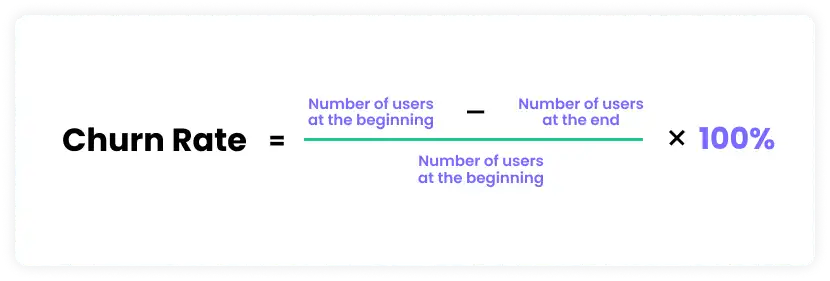Do you know how many customers you are losing every week or month? No? How would you measure your company's success if you don't know how many customers you are losing?
You might look at the number of new customers you are acquiring and think you are doing great.

But you will know the true story only when you look at customers who have stopped using your services.
And that's where churn rate comes into play, as it is the number of customers who have churned (stopped buying or using your service) in a certain period. Let's describe what churn rate is and how you can calculate and reduce it.
Table of contents
-
- 1. Investigate why your customers churn and fix the problems
- 2. Work on training your customer support and sales reps
- 3. Offer exclusive incentives to existing customers to prevent churn
- 4. Prevent churn at the early stages by having a comprehensive onboarding plan
- 5. Get feedback from customers
- 6. Send re-engagement emails
- 7. Retarget them with emails or ads
What is churn rate?
As discussed previously, churn is when a customer stops buying or using your product/ service. So, the churn rate is the number of customers who have stopped using your product or service within a certain period.
They are the customers who have gone "Bye Felicia" on you. Now, you might think, "that's fine, let them leave; I don't want to know who leaves." But it's crucial to know it. Here's why.
Why is it important to measure churn rate?
Here's why it's vital to measure and track your churn rate.
Helps you find out errors in your product or service
A customer might churn when problems with your product or service are not resolved. Or it could also be that what you offer doesn't meet the customer's needs. So looking at the churn rate can help you understand if there are any problems with the product and work on fixing them.
Helps identify problems with customer experience
But, when a customer churns, it doesn't always mean something is wrong with the product. It could also be that they didn't have a good experience using the product or get good customer support.
For example, someone is having some issues with their network, but the internet service provider doesn't answer their calls or provide customer support. In this case, after some time, they get annoyed and switch to a different internet provider.
So, looking at the churn rate can help you identify such problems with the customer experience, and you can then work on fixing them.
Help you get an idea of how the company would grow
Taking a look at your churn rate can help you understand how your company is growing and if it's on the right track or not. If the churn rate is lower than the growth rate, the company is growing, whereas if the churn rate is greater than the growth rate, the company is at a loss. You can also compare your churn rate with your competitors to see where you stand and if you are headed in the right way.
How to calculate churn rate?
Now, let's look at how to calculate the churn rate. Here are the steps to calculate the churn rate.
Step 1: Decide for what period you want to calculate the churn rate, like last month, last three months, or the past year.
Step 2: Find out the number of customers you had at the onset of the time you have decided on.
Step 3: Find out the number of customers who churned by the end of the duration.
Step 4: Divide the number of churned customers by the number of customers you had before the churn.
Step 5: Multiply the number you get after dividing by 100 to get the percentage.
And here's what the churn rate formula would look like:

For example, you have 100 subscribers at the beginning of the month, but you lose 14 subscribers by the end of the month. Your churn rate would be (14/100) x 100 = 14%.
Can you figure out if your churn rate is at a good number or not? It is tricky to answer because a good churn rate is subjective. Ideally, the churn rate should be zero or negative, which would mean there is no loss of customers. But it's not realistically possible, so you can check below what an ideal churn rate is for your industry.
Recurly has researched this average annual churn rate for different industries. Here are some of the average churn rates for various industries.
| Industry | Average churn rate [annual] |
|---|---|
| Saas | 4.79% |
| Media and entertainment | 5.23% |
| Education | 9.61% |
| Healthcare | 7.55% |
| Consumer goods | 9.62% |
| Consumer services | 7.49% |
| IoT | 5.88% |
How to lower your churn rate?
You must have gathered that churn is inevitable, and you can't avoid it. But, you can try to reduce it. Here are different ways to lower your churn rate.
1. Investigate why your customers churn and fix the problems
Find out why your customers leave or stop using your service. Is it the product, experience, lack of customer support, expensive plan? Look at what's going awry and fix it. Also, find out what you should do to prevent a similar customer from churning for the same reason.
2. Work on training your customer support and sales reps
Customers can churn when their expectations are not met. So your sales representatives should work on only selling the factual value of your product or service and what it can do so that customers don't get deceived.
And, apart from expectations, if they don't have a good experience, it can lead to churn. So make sure your customer support team can handle any problem brought forward by the client and help them with it to obtain customer satisfaction.
For example, your customer is looking for something only available in the premium plan. Then you should be able to make them understand that the particular feature is available but only in the premium plan. And if they want to use it, they'll have to upgrade to the premium plan. This will help them understand what to expect and where to find it.
Also read: How to Upsell Customers to Increase Your Business Revenue
3. Offer exclusive incentives to existing customers to prevent churn
It's always best to prevent churn before it happens. So you can offer your existing customers exclusive discounts, reward programs, personalized gifts, etc. It helps to keep them satisfied, prevent churn by earning their loyalty. When customers are satisfied, it might also encourage them to recommend your brand to people they know and increase customers.
Also read: How to Build a Successful Word of Mouth Marketing Strategy
4. Prevent churn at the early stages by having a comprehensive onboarding plan
Sometimes, customers churn when they think the product doesn't have what they need, but they don't know it does have it. So, when people sign up or buy your product/service, educate them about the product to make sure they know how it works and every feature it has.
You can educate your customers by using onboarding emails, 1:1 sessions, demos, etc. You can also create additional content like blogs, social media posts, and videos to educate your customers further and provide more value.
5. Get feedback from customers
Okay, so far, we have speculated on the reason and worked on the way to prevent it. But now, let's go straight to the source. Ask your customers directly for feedback at different moments across the customer journey.
You can ask them a few days after they have used your product after completing the trial or if you notice that they have started to become inactive. This way, you'll have a complete idea of your customer's feelings about your product at different customer journey points.
And this data can help you fix issues and improve their experience in real-time. Did you know that you can use AMP to send an interactive email for collecting feedback from your users within the email itself?
If you would like to read up on how this works, check out how Stratzy used Mailmodo and sent interactive emails to recover their churned users.
6. Send re-engagement emails
Re-engagement emails are a way to resurrect your churned users or target inactive users who are about to churn. You can send win-back emails to such people as it will help you re-engage them and get them interested in your brand again.
7. Retarget them with emails or ads
As we have done previously, you will look at the churned users' purchase history to determine the reason for churn and the issues they faced. After which, you can send them retargeted emails where you address the issue and provide feasible solutions. Or, if they have just forgotten about you, you can use retargeting ads to try to capture their attention.
Related guide: How to Use Display Ads For Retargeting Users
Start calculating today
Use the churn rate formula mentioned in the guide to calculate your churn rate today and see how your company is doing. And if it's high, implement the tips mentioned above to reduce your churn rate.
Now, apart from reducing churn, there is another way you can grow your business and revenue through cross-selling. Read our guide on it to find out how you can cross-sell to increase your customer satisfaction and increase your revenue.
What you should do next
Hey there, thanks for reading till the end. Here are 3 ways we can help you grow your business:
Talk to an email expert. Need someone to take your email marketing to the next level? Mailmodo’s experts are here for you. Schedule a 30-minute email consultation. Don’t worry, it’s on the house. Book a meet here.
Send emails that bring higher conversions. Mailmodo is an ESP that helps you to create and send app-like interactive emails with forms, carts, calendars, games, and other widgets for higher conversions. Get started for free.
Get smarter with our email resources. Explore all our knowledge base here and learn about email marketing, marketing strategies, best practices, growth hacks, case studies, templates, and more. Access guides here.


